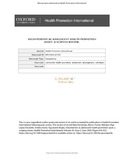Mostrar el registro sencillo del ítem
Volunteerism as adolescent health promotion asset: a scoping review
| dc.creator | Hernantes Colias, Naia | es_ES |
| dc.creator | Pumar Méndez, María Jesús | es_ES |
| dc.creator | López de Dicastillo Sáinz de Murieta, Olga | es_ES |
| dc.creator | Iriarte Roteta, Andrea | es_ES |
| dc.creator | Mujika Zabaleta, Agurtzane | es_ES |
| dc.date.accessioned | 2024-04-03T16:04:29Z | |
| dc.date.available | 2024-04-03T16:04:29Z | |
| dc.date.issued | 2020 | |
| dc.identifier.citation | Hernantes, N., Pumar-Méndez, M. J., López-Dicastillo, O., Iriarte, A., Mujika, A. (2020) Volunteerism as adolescent health promotion asset: a scoping review. Health Promotion International, 35(3), 610-623. https://doi.org/10.1093/heapro/daz026. | en |
| dc.identifier.issn | 0957-4824 | |
| dc.identifier.uri | https://hdl.handle.net/2454/47818 | |
| dc.description.abstract | The Aim of this scoping review was to explore the available literature on volunteerism in adolescence and the benefits that this activity may report in their healthy development, from a salutogenic perspective. Searches were conducted in Pubmed, Cinahl, PsycINFO and Cochrane Library home databases; 15 articles were selected. Almost all of the studies were conducted in the United States between 1990 and 2000, primarily developed by psychologists and sociologists. The impact of volunteering was reflected in aspects that can be classified based on Lerner's dimensions of the PYD model. Volunteer activities promote an Improved academic, social, cognitive, and vocational competence in adolescents. An increase in conflict resolution capacity, leadership and personal agency, as well as improved pro-social attitudes and relationships with adults and peers, all of which contributed to their self-identification with the community. Moreover, increased positive development of adolescents reduces the rates of risky behaviors. Volunteerism may represent an opportunity for health promotion in adolescence. The concept of volunteering as an asset for health promotion during adolescence evokes the need to adopt and favor this view with regard to key areas of study associated with this stage such as education and health. Teams that work in community health, especially those in primary care, should recognize and value existing volunteer groups as an asset to promote the healthy development of adolescents. Friendlier health services should be encouraged that include comprehensive services from within educational institutions to community actions. | en |
| dc.format.mimetype | application/pdf | en |
| dc.language.iso | eng | en |
| dc.publisher | Oxford University Press | en |
| dc.relation.ispartof | Health Promotion International 2020, 35(3), 610-623 | en |
| dc.rights | © The Author(s) 2019. Published by Oxford University Press. All rights reserved. For permissions, please email: journals.permissions@oup.com | en |
| dc.subject | Adolescence | en |
| dc.subject | Volunteers | en |
| dc.subject | Community | en |
| dc.subject | Salutogenesis | en |
| dc.subject | Positive youth development | en |
| dc.title | Volunteerism as adolescent health promotion asset: a scoping review | en |
| dc.type | Artículo / Artikulua | es |
| dc.type | info:eu-repo/semantics/article | en |
| dc.date.updated | 2024-04-03T15:54:04Z | |
| dc.contributor.department | Ciencias de la Salud | es_ES |
| dc.contributor.department | Osasun Zientziak | eu |
| dc.rights.accessRights | Acceso abierto / Sarbide irekia | es |
| dc.rights.accessRights | info:eu-repo/semantics/openAccess | en |
| dc.identifier.doi | 10.1093/heapro/daz026 | |
| dc.relation.publisherversion | https://doi.org/10.1093/heapro/daz026 | |
| dc.type.version | Versión aceptada / Onetsi den bertsioa | es |
| dc.type.version | info:eu-repo/semantics/acceptedVersion | en |


